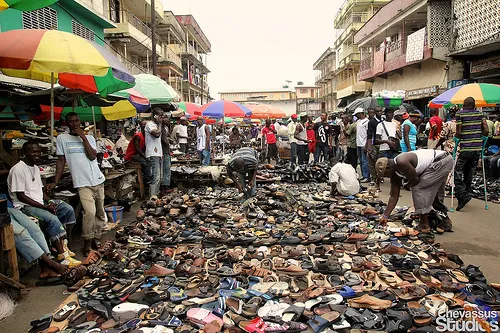By Amadu N. Mansaray
Business activities in the Freetown municipality have caused serious traffic congestions that are affecting vehicular and pedestrian movements. This traffic congestion is largely seen in Kissy Road, Sani Abacha Street, Rawdon Street to name just a few.
Pedestrians and drivers find it difficult to cope with the situation as they most time spend longer period on the road which adversely affect their daily activities.
Besides, the congested roads are not well kept. Litters are seen on the streets and gutters, creating a safe breeding ground for germs and other parasites.
Trading and commercial activities pose potential problems of hygiene and sanitation in a city characterized with limited water and electricity supply.
Diseases can spread so quickly if not tackled, and peoples contact such infections through skin contact amid densely populated streets and business places within the central business district, not to talk of exposures of food to air and flies which have the propensity of causing outbreak.
Revelations are that, aside from the problems street traders encounter on daily basis, they also pose a problems to the non-street traders in Freetown, with regards traffic congestions, poorly handled waste management and unhealthy competitions over customers and pedestrians from accidents.
Despite the issue of traffic congestion and other problem face by street trading, the issue of expire goods and their effects on the general wellbeing of citizens should not be treated with a pinch of salt.
Stock piles of expired goods find their ways in the public through street traders. Such expired food stuffs live citizens with stomach and other health complications as a result of consuming.
With the increase unfavourable sale by most whole sellers and importers in the markets, has largely affect goods parked in stores, since the operation is on a small-scale.
Majority of those street traders operate in front of public places like big shops, main junctions, bus stations and market areas, covering the main entrances of trade merchandised in Sani Abacha streets and other streets in the central business district.
Separate from the environmental risks associated with street trading in the central business district, it’s also creates negative impact when it comes to the movement of traffic, making the situation more worsen.
Citizens are calling on the municipality management of the Freetown City Council, (FCC) to intensify measures to improve the country’s capital, in the area of cleanliness and other forms of livelihood supports to city residents.
The demand for additional trash bins in major intersections in the central business district to avoid littering of garbage seem sweeping the corners of the capital and its environs.
Child welfare organizations have attributed reasons for the high rate of school dropout having some link with street trading, considering it’s an easy route to make money and by so doing living a very comfortable live in the not too distant future.
Despite the FCC generate considerable amount of revenue from street traders, yet, the council still unable to provide a central market that will accommodate all traders in the central business district, thereby creating more challenges for street traders.
Due to huge traffic encounter in certain streets in the central business districts like Abacha Street, Wilberforce Street, among others, pedestrians also need to keep watchful eyes for pick pocketers parading those streets in a very busy manner.
Since time memorial, street trading in Freetown and other part of the regions don’t operate a uniform price, regardless of the fact that the products and design remain the same, especially so when the country is operating a free market economy system.
With street traders constitute appreciable percentage of petty traders in the country, Sani Abacha Street have over the years being regarded as a breeding or starting point for many that had and continues to strive in whole sale and retail businesses.
The famous Sani Abacha Street, by the look of things, serves as an informal trade academy where skills, experiences in managing mega resources acquired.
Regardless of the potential to generate huge business capital with mega resources possible in petty trading in the capital and its environs, petty trading still face huge challenges in the area of storage facilities and financial resources to booster their businesses.
In a low income country like Sierra Leone, most, if not all successful business men/woman started their businesses in petty trading, having been the sole approach available. Trade based and human rights organizations are calling on the central government to create access to finance and suitable central modern market with proper storage facilities if only the government is truly serious about nipping street trading in the central business district in the board.













